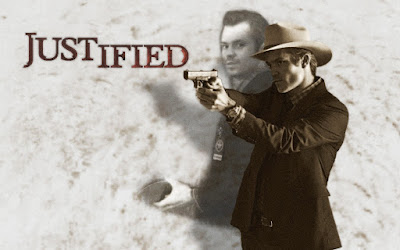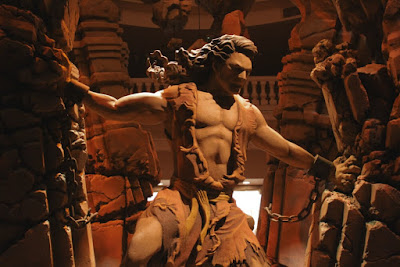Today, I'm
sharing an essay I wrote for another of my blogs: “bit
Lit: Short Stories Anesthetized, Euthanized, and Sterilized.”
It's a critical analysis of Ray Bradbury's under-appreciated short
story, “Heavy-Set.” This story, which originally appeared in Playboy magazine (October 1964) showcases Bradbury's talent and
exhibits his mastery not only of fantasy and science fiction, but
also of the horror genre.
Copyright 2008 by Gary
L. Pullman
"Heavy-Set"
is, in fact, a lesson in how to use understatement to heighten
suspense, terror, and horror.
It starts by
identifying the main character, who is not Heavy-Set, but his mother,
thus orienting the story to follow from her perspective, although the
narrative itself is told from the point of view of an omniscient
narrator. The opening sentence also establishes an everyday setting,
which will sharply contrast with the tale’s understated terror:
“The woman stepped to the kitchen window and looked out.” In
doing so, she sees her son, Leonard, among the many weights with
which he works out on a regular basis:
There in the
twilight yard a man stood surrounded by barbells and dumbbells and
dark iron weights of all kinds and slung jump ropes and elastic and
coiled-spring exercisors. He wore a sweat suit and tennis shoes. . .
.
This was her son, and everyone called him
Heavy-Set.
By continuing to insert “and” between
the items in the series in which he identifies the equipment that
Heavy-Set uses, Bradbury stretches out the list of items, thereby
impressing upon his readers how many items of equipment Heavy-Set has
on hand. “A man stood surrounded by barbells and
dumbbells and dark
iron weights of all kinds and
slung jump ropes and
elastic and coiled-spring exercisors [bold added]” is more
effective, for this reason, than “a man stood surrounded by
barbells, dumbbells, dark iron weights of all kinds, slung jump
ropes, and elastic and
coiled-spring exercisors [bold added]” would be. It’s rhythm is
also more melodious. It is in these seemingly small matters of
diction and style that the truly great writers take pains to shine,
and Bradbury, even among other established writers of his genre, is
known for his perfection in this regard.
Next,
Bradbury stresses the size and strength of the antagonist:
Heavy-Set squeezed the little bunched, coiled springs in
his big fists. They were lost in his fingers, like magic tricks; then
they reappeared. He crushed them. They vanished. He let them go. They
came back.
Bradbury is such a skilled craftsman that
he easily accomplishes several objectives at once--or, at least, like
all true masters, he makes doing so look
easy. In the short paragraph just quoted, for example, he emphasizes
Heavy-Set’s size and strength with such phrases as “big fists”
and “lost in his fingers,” but his description of Heavy-Set
exercising with the “coiled springs,” employing the simile “like
magic tricks” and short sentences (“He crushed them. They
vanished. He let them go. They came back.”), also makes readers see
this character exercising and, more than this, makes them see, also,
how Heavy-Set
exercises: slowly, methodically, purposefully. For him, exercise is
more than merely exercise; it is ritualistic, perhaps even
therapeutic. His devotion to his workouts is reinforced by the
single-sentence paragraph that follows the description of Heavy-Set
at work with the “coiled springs”: “He did this for ten
minutes, otherwise motionless.” It is obvious that he is focused.
Indeed, it is almost as if he is one with the springs that he crushes
and lets go.

Readers see, next, that
lifting a one-hundred-pound set of barbells is easy for Heavy-Set; he
does so without effort:
“Then he bent
down and hoisted up the one-hundred-pound barbells, noiselessly, not
breathing. He motioned it a number of times over his head, then
abandoned it” for a punching bag, which he punched. . . easily,
swiftly, steadily,” working it over the same way he worked the
weights.
He is proud of his size and strength; his
physical prowess is the basis of his self-image and, perhaps, his
self-esteem. As he finishes his evening’s exercise regimen, he
fills “his lungs until his chest” inflates to “fifty inches”
and stands “eyes closed, seeing himself in an invisible mirror
poised and tremendous, two hundred and twenty muscled pounds, tanned
by the sun, salted by the sea wind and his own sweat.”
Having
established the size and strength of his story’s antagonist,
Bradbury next establishes Heavy-Set’s “childlike” nature by
having him carve Halloween pumpkins, as if it were a “job” in
which to take pride, rather than a few moments’ pastime:
He had gone out
earlier in the day and bought the pumpkins and carved most of them
and did a fine job: they were beauties and he was proud of them. Now,
looking childlike in the kitchen, he started carving the last of
them. You would never suspect he was thirty years old. . . .
There is the suggestion that Heavy-Set may
be mentally handicapped. His mother, who is very much aware of how
much her son exercises, hearing “him every night drubbing the
punching bag outside, or squeezing the little metal springs in his
hands or grunted as he lifted his world of his weights,” seems to
dote upon him for this very reason. She is extremely solicitous of
his comfort and enjoyment, asking him whether he liked the dinner she
prepared for him and telling him that she bought “special steak”
and “fresh” asparagus. When he says that “it was good,” she
replies, “I’m glad you liked it, I always like to have you like
it.” The strange syntax stresses her desire to please her son, and
readers wonder whether her solicitude is meaningful beyond
itself.
Although girls and
“eighteen-year-old boys” are attracted to him, for different
reasons--the girls wanting to date him and the boys looking up to
him--Heavy-Set avoids their company, and his mother is “used, by
now, to hearing Heavy-Set each night on the phone saying he was tired
to girls and. . . no, no he had to wax the car tonight or do his
exercises to the. . . boys.” He seems to have trouble with
relationships with others and avoids situations that could lead to
such associations, whether of a dating or of a more general and
casual sort, his difficulty reinforcing the suggestion that he may be
mentally handicapped.

He seems better able
to interact with young people in a group, for a limited amount of
time, as he plans to attend a Halloween party to which he‘s been
invited indicate. He has “bought two jugs of cider,” he tells his
mother, in case “they all show up,” although, he worries, “they
might not show up.”
As the story
progresses, Bradbury’s narrator continually inserts references to
Heavy-Set’s weightlifting and his squeezing of the exercisors.
Bradbury also repeatedly alludes to his antagonist’s size. Such
repetition has the effect of highlighting these actions and
characteristics.

The narrator next
associates the character’s physical prowess with his immaturity.
After Heavy-Set finishes carving the last of his pumpkins, he moves
“into his bedroom, quietly massive, his shoulders filling the door
and beyond,” from whence he returns dressed in a very childlike
costume, indeed, consisting of “a pair of short black pants, a
little boy’s shirt with a ruff collar, and a Buster Brown hat”
and “licking a gigantic peppermint-striped lollipop.” To his
mother, he announces, “I’m the mean little kid!” If there were
any question as to the antagonist’s being mentally handicapped, his
dressing, at age thirty, in such an outfit eliminates all such doubt.
His mother humors him as he parades before her, pretending to lead “a
big dog on a rope,” exclaiming, “You’ll be the life of the
party!” Nevertheless, she finds his antics “exhausting.”
Readers suspect that putting up with the immature thirty-year-old man
is no easy task for her.
Heavy-Set’s
“childlike” nature becomes more apparent as one of the
“eighteen-year-old boys” with whom he sometimes interacts calls
to tell him that many of them won’t be attending the party. Unlike
Heavy-Set, who avoids girls, the boys, although twelve years his
junior, are more interested in dating than they are in attending a
Halloween costume party, and “half the guys,” he learns, “aren’t
showing up at the party” because they have “other dates.”
Tommy, the boy who’s called to relay this news, says he himself has
“a date with a girl.”
When, dejected,
Heavy-Set says, “I ought to throw the pumpkins in the garbage,”
his mother encourages him to go to the party, anyway, assuring him
that “there’ll be enough for a party” and that he should “go
on and have a good time,” especially since he hasn’t “been out
in weeks.”

The narrator informs the
readers that Heavy-Set has dated two girls during the past decade,
neither of which date went well. His more customary way of spending
his days is in solitary pursuits such as playing “a game of
basketball with himself. . . in the backyard,” swimming, surfing,
or, of course, working out with his weights and punching bag. In such
activities (all of which are typical of men younger than he),
Heavy-Set finds momentary release from the tension and stress that
results from his loneliness and his inability to establish or
maintain adult relationships. They are also a means for him to
repress his sex drive, as the following description, with its
almost-subliminal metaphorical allusion to orgasm, indicates:
Some nights he
stood around like this and then suddenly vanished and you saw him way
out in the ocean swimming long and strong and quiet as a seal under
the full moon or you could not see him those nights the moon was gone
and only the stars lay over the water but you heard him there, on
occasion, a faint splash as he went under and stayed under a long
time and came up, or he went out [as if on a date] sometimes with his
surfboard as smooth as a girl’s cheek, sandpapered to a softness,
and came riding in, huge and alone on . . . [an ejaculatory] white
and ghastly wave that creamed along the shore. . . .
Although he has opportunities to date, he
passes on them, and the boys who admire his physique, once they turn
twenty-one, abandon him, to be replaced by a new set of youthful
admirers who shall also abandon him in due time.
As
the protagonist thinks of her son, Leonard, whom his youthful friends
call “Heavy-Set” or “Sammy,” which is “short for Samson,”
or “Butch” or “Atlas” or “Hercules,” her exhaustion comes
through, and readers get a sense of her own desperation. Earlier,
while she’d been watching her son parade in his Buster Brown
costume, Heavy-Set’s mother felt “exhausted.” Now, readers
learn that her son’s condition affects her in other ways, too. She
is also lonely. Her son is uncommunicative and regards her not so
much as his mother but as a generic female, “the woman,” who
waits on him hand and foot and is always solicitous of his happiness
and comfort:
He went into the
kitchen. “I guess there’ll be enough guys there,” he said.
“Sure there will,” she said, smiling again. She always smiled
again. Sometimes when she talked to him, night after night, she
looked as if she were lifting weights, too. When he walked through
the rooms she looked like she was doing the walking for him. . . .
Having reassured him, again, that plenty
of his acquaintances will be present at the party, his mother shoos
him out the door, saying, “Fly away.” These words are as much a
hope for herself as they are an encouragement to him. She hopes that
he will do just this, like a bird that has been too long in the nest.
His presence prevents her from living a full and independent life,
for her own is devoted, almost entirely, to caring for him, despite
the fact that Heavy-Set does, indeed, have a job of sorts, working
“on the high power lines all day, up in the sky, alone.”
As
the evening grows later, she keeps an eye out for her son’s return,
hoping against hope, all the while, that, at last, he may have met
“someone” and won’t be coming home, in which case, she herself
will be free:
What if, she
thought, he found someone tonight, found someone down there, and just
never came back, never came home. No telephone call. No letter, that
was the way it could be. No word. Just go off away and never come
back again. What if? What if?
However, her desperate hope is
short-lived, as she thinks, “No!. . . there’s no one, no one
there, no one anywhere. There’s just this place. This is the only
place.”
Earlier, she wondered what
happened in her son’s life to retard his emotional development and
to make him want nothing to do with girls, with sex, with marriage,
or a normal life. Her questions show that she does not know much
about her son, despite having lived with him for thirty years. He
doesn’t communicate much, except when he is angry or disgruntled.
There may not be much depth to him, and he certainly does seem to be
mentally handicapped. He may harbor latent homosexual tendencies, as
he is more concerned with what teenage boys think of him than he is
with the marginal women who dote upon him. He seems, in a way, to
court the teenage boys’ favor and admiration, rather than to avail
himself of the pitiable women who display an interest in him, and his
mother appears to attribute his behavior to a past traumatic event,
possibly molestation, that he’s never mentioned to her:
Leonard, my good
boy. . . . just where, in all the years, did the thing happen that
put him up that pole alone and working out alone every night?
Certainly there had been enough women, here and there, now and then,
through his life. Little scrubby ones, of course, fools, yes, by the
look of them, but women, or girls, rather, and none worth glancing at
a second time. Still, when a boy gets past thirty. . . .
Readers also learn that much of the
mother’s solicitude has to do with her fear of her oversize,
mentally handicapped son rather than with her concern for his comfort
and pleasure. She seeks to keep him content, as much as possible, to
prevent his losing his temper and becoming violent with her, “the
woman.”

Heavy-Set comes home from the
party early and upset. He explains to his mother that only a few
people showed up, and no one but him wore a costume. Despite his
efforts to amuse them, the other partygoers simply stood around. The
boys were more interested in their dates than they were in the party,
and “just stood around” before, in couples, they went off to the
beach together, leaving Heavy-Set alone:
“They
had their girls with them and they just stood around with them and
wouldn’t do anything, no games, nothing. Some of them went off with
the girls. . . . They went off up the beach and didn’t come back. .
. . I felt like a fool, the only one there dressed like this, and
them all different, and only eight out of twenty there, and most of
them gone in a half an hour. Vi was there. She tried to get me to
walk up the beach, too. I was mad by then. I was really mad. I said
no thanks. And here I am. You can have the lollipop. . . . Pour the
cider down the sink, drink it, I don’t care.”
The
narrator has suggested that Heavy-Set alleviates tension by
exercising and working with his weights. Heavy-Set does so again,
now, his mother watching and listening to her son punch the bag.
Assessing the level of his anger by the time that he works the bag,
she concludes that he is especially angry tonight:
He must have
drubbed the punching bag until three in the morning. Three, she
thought, wide awake, listening to the concussions. He’s always
stopped at twelve before.
When he finally stops punching the bag, he
comes into the house, and his mother has “a feeling he still”
wears “the little boy suit,” but she doesn’t “want to know if
this were true.”
She retired for the
night long ago. Now, her son joins her in bed, lying beside her, “not
touching her.” She feigns sleep, aware that her son’s body is
“rigid,” and feels the “bed shake as if he were laughing.”
More likely, he is weeping soundlessly, disheartened by the
brokenness of his personality and the fiasco of the party at which
he’s humiliated himself, and then he begins to work the “coiled
spring exercisors,” and she wants to “slap them out of his
fingers”--until a disturbing thought occurs to her: “What would
he do with his hands? What could he put in them? What would he, yes,
what would he do with his hands?” Her only recourse, she believes,
is prayer, so she prays:
So she did the only
thing she could do, she held her breath, she shut her eyes, listened,
and prayed, O God, let it go on, let him keep squeezing those things,
let him keep squeezing those things, oh, let him, let him keep
squeezing. . . let. . . let. . .
It was
like lying in bed with a great dark cricket.
And
a long way before dawn.
Perhaps,
readers may suppose, Heavy-Set has gotten into bed beside his mother
to assault her, both sexually and physically, and perhaps to kill
her. She certainly seems frightened enough to warrant such an
interpretation. However, it seems more likely that he has gotten into
bed next to her because he seeks comfort. He has experienced a
traumatic humiliation, and he understands, perhaps, on some level,
conscious or otherwise, that he is not normal, that he does not
behave as even younger males do, and that his interests are immature
and “childlike,” rather than manly. At thirty, he is single and
still lives at home, with his mother. He may even still wear “the
little boy suit” over his man-size body, she thinks.
Physically,
Heavy-Set is strong and powerful. He appears to be manly, but he
lacks virility, and, intellectually and emotionally, he is weak and
boyish. These qualities, and his latent homosexuality, seem to
suggest that he sees his mother, as “the woman”--an alien, but,
nevertheless, comforting, presence. He does not relate to her
sexually but as a dependent and inadequate youth relates to an
independent and self-sufficient adult provider and caregiver. He
seems to want comfort, not sex. At the same time, however, as he gets
older, she is apt to become less and less able to provide the
maternal nurture and comfort that she more easily supplied him in his
younger days. If she stops giving the reassurances he needs, she is
afraid that she will no longer be necessary to him, and he may, in a
pique of uncontrolled temper, take out his frustrations and fears,
his disappointments and helplessness, his defeat and impotence upon
her. As an aging Atlas, he longer carries the world as easily upon
his shoulders as his younger admirers, male and female, may
suppose.
Although he’s known more for
science fiction or fantasy than he is for horror, Bradbury’s
“Heavy-Set” proves that the master is capable of writing superb
horror fiction as well.
Horror stories
typically start with an everyday situation, as “Heavy-Set” does,
gradually introducing an element of the bizarre. In this case, this
element is the discrepancy between the thirty-year-old, fit and
muscular antagonist and his minimal intellect, emotional maturity,
and social skills which, becoming clearer and clearer as the
antagonist ages, traps both him and his victim, his own mother, in an
existential trap that narrows more each year, threatening, ever, to
spring shut upon them. Because of Bradbury’s masterful, understated
storytelling, this subtle story of a man’s interrupted development
is horrific, indeed. Readers are likely to say, along with the
protagonist, “Let him keep squeezing those things!”

















































